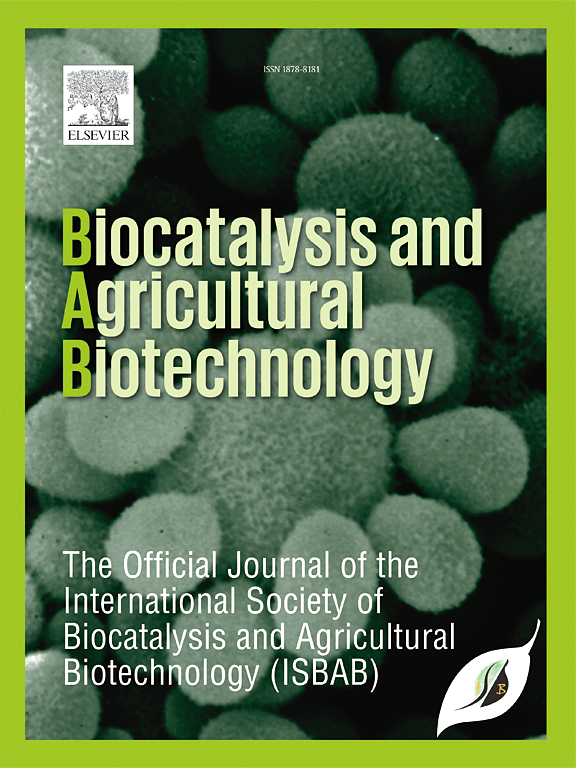Enhancing anti-inflammatory activity of noni (Morinda citrifolia L.) juice using lactic acid fermentation by Leuconostoc lactis for developing fermented noni microcapsules as a novel nutraceutical supplement
IF 3.4
Q2 BIOTECHNOLOGY & APPLIED MICROBIOLOGY
引用次数: 0
Abstract
Noni is a pantropical species with fruits containing bioactive compounds that exhibit significant anti-inflammatory effects, which could be beneficial in managing chronic inflammatory conditions. This study aimed to evaluate the effects of lactic acid fermentation by Leuconostoc lactis on the physicochemical properties, bioactive compounds, and potential anti-inflammatory effect of fruit juice and subsequent freeze-dried fruit juice powder of noni grown in Vietnam. Results showed that fermentation significantly reduced total phenolic content (1650.06–568.56 mg GAE/L) and flavonoid content (1016.06–210.96 mg QE/L) along with antioxidant activity (1035.24–1774.14 to 358.78–959.72 mg TE/L) of noni juice. Despite these reductions, fermented noni juice (FNJ) demonstrated enhanced anti-inflammatory properties, particularly in suppressing pro-inflammatory cytokines IL-6 (30.65–35.48 % reduction) and NO (29.67–31.00 % reduction). Interestingly, freeze-dried fermented noni powder (FNP) exhibited higher antioxidant activity than non-fermented samples, with DPPH, ABTS, and FRAP values higher by 6.4 %, 4.1 %, and 16.4 %, respectively. In vitro digestion studies revealed improved bioavailability of phenolics in FNP, with 10.55 % release in the intestinal phase compared to 7.96 % for non-fermented noni powder (NFNP). These results suggest that lactic acid bacteria fermentation can modulate bioactive compound profiles and potentially enhance the functional properties of noni-based products. It is worth noting that the freeze-drying resulted in the total loss of anti-inflammatory properties in unfermented noni extract powder, whereas fermentation partially retained the anti-inflammatory compounds, allowing fermented powder to maintain its anti-inflammatory effects. This study demonstrates that lactic acid fermentation significantly enhances the anti-inflammatory properties of noni extract, making it a promising candidate for functional supplement applications.
利用乳酸菌乳酸发酵提高诺丽汁的抗炎活性,开发诺丽微胶囊作为一种新型营养保健品
诺丽是一种泛热带植物,其果实含有具有显著抗炎作用的生物活性化合物,这可能对治疗慢性炎症有益。本研究旨在探讨乳酸发酵对越南诺丽果汁及其冻干果汁粉的理化性质、生物活性成分和潜在抗炎作用的影响。结果表明,发酵可显著降低诺丽汁总酚含量(1650.06 ~ 568.56 mg GAE/L)和类黄酮含量(1016.06 ~ 210.96 mg QE/L),抗氧化活性(1035.24 ~ 1774.14 ~ 358.78 ~ 959.72 mg TE/L)。尽管有这些减少,发酵诺丽汁(FNJ)显示出增强的抗炎特性,特别是抑制促炎细胞因子IL-6(减少30.65 - 35.48%)和NO(减少29.67 - 31.00%)。有趣的是,冻干发酵诺丽粉(FNP)的抗氧化活性比未发酵样品高,DPPH、ABTS和FRAP值分别高出6.4%、4.1%和16.4%。体外消化研究表明,FNP中酚类物质的生物利用度提高,肠道期释放量为10.55%,而非发酵noni粉(NFNP)为7.96%。这些结果表明,乳酸菌发酵可以调节生物活性化合物的分布,并有可能提高noni基产品的功能特性。值得注意的是,冷冻干燥导致未发酵诺丽提取物粉末的抗炎特性完全丧失,而发酵部分保留了抗炎化合物,使发酵粉末保持其抗炎作用。本研究表明,乳酸发酵可显著增强诺丽提取物的抗炎特性,使其成为功能性补充剂应用的有前景的候选物。
本文章由计算机程序翻译,如有差异,请以英文原文为准。
求助全文
约1分钟内获得全文
求助全文
来源期刊

Biocatalysis and agricultural biotechnology
Agricultural and Biological Sciences-Agronomy and Crop Science
CiteScore
7.70
自引率
2.50%
发文量
308
审稿时长
48 days
期刊介绍:
Biocatalysis and Agricultural Biotechnology is the official journal of the International Society of Biocatalysis and Agricultural Biotechnology (ISBAB). The journal publishes high quality articles especially in the science and technology of biocatalysis, bioprocesses, agricultural biotechnology, biomedical biotechnology, and, if appropriate, from other related areas of biotechnology. The journal will publish peer-reviewed basic and applied research papers, authoritative reviews, and feature articles. The scope of the journal encompasses the research, industrial, and commercial aspects of biotechnology, including the areas of: biocatalysis; bioprocesses; food and agriculture; genetic engineering; molecular biology; healthcare and pharmaceuticals; biofuels; genomics; nanotechnology; environment and biodiversity; and bioremediation.
 求助内容:
求助内容: 应助结果提醒方式:
应助结果提醒方式:


